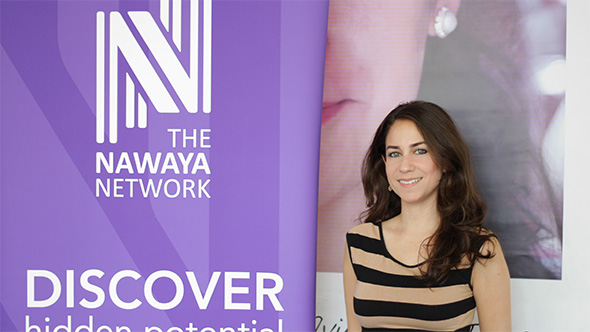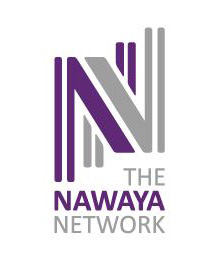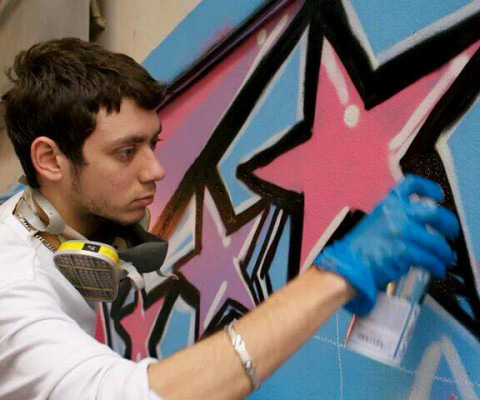Nawaya Network: Mentoring Lebanon’s At-Risk Youth
Nawaya Network is a non-profit organisation based in Lebanon. They identify promising, talented youth who come from disadvantaged, marginalised or at-risk backgrounds and who have a talent or potential in a certain area but lack the means to pursue it. Their intention is to connect these young people to various resources such as mentors, trainers, classes, funding, internships, and job opportunities to help them develop their skills and generate an income.
Interview with Zeina Saab, Founder of Nawaya Network

Nawaya means intentions in Arabic. For our readers who do not know about your NGO, tell us a little bit about your intentions and mission.
Nawaya Network is a non-profit organisation based in Lebanon. We identify promising, talented youth who come from disadvantaged, marginalised or at-risk backgrounds and who have a talent or potential in a certain area but lack the means to pursue it. Our intention is to connect these young people to various resources such as mentors, trainers, classes, funding, internships, and job opportunities to help them develop their skills and generate an income.
What is the story behind Nawaya Network? What inspired you to get started?
Back in 2009, I was working on a project here in Lebanon in a small village. A young girl came up to me and started showing me some really beautiful sketches of dresses that she had drawn; I realised that this girl had all the talent it takes to become a fashion designer but she simply lacked the means to become one. She was living in a remote village, with no one there to guide her and she was far away from all of the possible trainers. All of her talent and ability came from within and from observations that she had made growing up. I thought to myself that there must be so many other young people just like her, with so much talent but because of life´s circumstances, are simply unable to get to where they deserved to be.
After being in Lebanon in 2009, I left to work in the UN in New York for a year after that but the idea stayed with me and I remained unfulfilled until I was able to set up this organisation. I came back here in 2011 and for the past three years, I have been working on building it up.
Introduce us to your educational and professional background. What made you come back to Lebanon?
I was born here but when I was three years old, my family moved to the USA and I was raised in California. Every summer we had the privilege of coming to Lebanon to spend two months here with my family. That is when my brother and I became really attached to this country as we learned more about the history, the politics, and the issues to do with poverty, civil war, development in Lebanon and in the region. I was able to identify the differences between living a stable, secure, and peaceful life in the USA versus growing up here. A lot of my friends and relatives were not able to grow up in such a secure environment. I thought to myself, “What can I do as a Lebanese American to give back to my motherland?” It was always a dream of mine to try to move back here and make a difference in some way.
There are so many incredible young individuals in this country and not just in Lebanon but all around the world. Nawaya has had the privilege to work with incredibly talented youth in fashion design, basketball, football, mosaic design, singing, violin, graffiti art and more. We work with youth with a wide spectrum of backgrounds such as art, music, dance, athletics, writing, photography, filmmaking etc. We work with one girl called Reine who has been making the news lately because she was recently offered the chance to fly to New York to take a two-week intensive dance course. A lot of our youth find many opportunities through our network because we are able to share their stories on our platform on www.nawaya.org and communicate their inspiring stories to the public through social media.
We have various programs here at Nawaya, one of which is the mentorship program. Because I grew up America, I had always heard of mentor programs such as Mentor USA and Big Brothers Big Sisters of America. Here many of the youth that come from at risk backgrounds don´t have any role models in their lives. I thought that it would be great if we could connect them to mentors who would be able to be their friends, someone to confide in, and someone to help guide them in life.
Another program we have is the training program where we enrol young people in various workshops and classes. We cover their transportation and enrolment fees, as well as the cost of the equipment and materials used that they otherwise can´t afford.
Another program we have is the internship and job placement program where we connect our youth to young professionals and the business environment. With this program, they can meet with these people in the community, get inspired and learn about what it takes to be successful. Our ultimate aim is to develop their soft skills and life skills. At the end of the day, these young people might not become professional basketball players, football players, artists or musicians etc. but that is not the end goal for us. The end goal for us is all the skills that they are gaining from these programs. These young people are gaining self-esteem, self-confidence, a sense of self-worth, as well as learning about communication, teamwork, tolerance, flexibility, work ethic etc. This is the main idea behind having a network focused on youth talent, because at the end of the day, the youth here who come from disadvantaged backgrounds don’t necessarily have much to look forward to and they don’t feel like they have a future or hope. So, if we open the doors for them and help them realise that through their talent and their passion they can get somewhere that can change everything.
What are your biggest obstacles and challenges?
There are so many incredible young individuals in this country and not just in Lebanon but all around the world. Nawaya has had the privilege to work with incredibly talented youth in fashion design, basketball, football, mosaic design, singing, violin, graffiti art and more.
Our biggest obstacles are numerous in this country and unfortunately, they seem to be getting worse and worse. This region seems to be up in flames, which is depressing, frustrating and demotivating. Obviously, this is due to the security situation and the instability here. We are based here in Lebanon, we work with youth in the community and safety is an issue.
Another challenge is funding, we are a non-profit organisation and as there are so many incredible NGOs working here, there are limited resources to continue growing and scaling up. We are therefore trying to transition into a social enterprise whereby we are able to identify key services through Nawaya that we can offer potential clients to help us generate an income and be sustainable. We are currently consulting with a business development consultant to help us become more financially solvent, so that we don’t wake up one morning and realise we have to cut some programs or can’t continue our operations.
The Lebanese economy unfortunately is not growing; there is 21% youth unemployment and it is expected to increase by 10% by the end of 2014. One hundred and seventy thousand Lebanese people could slide into poverty and with a population of 4 million Lebanese that is a huge percentage. There are no jobs and so many young people are leaving the country; this has been the reality for a while now and so there is a real brain drain. The good thing is entrepreneurship is becoming a major buzzword in the region and in Lebanon. In various ways, the private sector and different initiatives are supporting start-ups, which is a very good thing in order to absorb the high unemployment rate in the country and in the region. We need new companies to be created because the current market can´t absorb the new graduates every year. We need stability, government intervention, support, FDI etc. With an unstable country no one is going to want to invest here. The prime thing is to try to focus on finding ways to help this country become more stable and once that is a reality I think that FDI will increase automatically because Lebanon has always been known to attract many investors from abroad. It is a very promising country.
How many donors do you have now?
The idea for Nawaya came to me in 2009. In 2011, I started working on the project, researching, networking, taking classes and trying to figure out how to get funding. In 2012, we crowd funded online, and that is where the bulk of our funding came from. We also had an offline fundraiser. That was what helped us get more visibility in the community and gave us a media spotlight. As a result, we were able to attract some major donors such as the King Abdullah Fund for Development, Alfanar in the UK, the Global Fund for Children and USAID. We have also had other sponsors such as British Airways and BBAC Bank. Thus, we have been fortunate to have some major partners working with us. We hope that with more success stories we will be able to attract more of these types of supporters.
What is your strategy for raising funds?
The initial way that we got donations was by focusing on crowd funding and offline fundraisers. For example, at the end of August, we are going to have a major fundraiser event with Lebanon’s King of Comedy, Nemr Abou Nassar, who has decided to support Nawaya and so all proceeds will go to our NGO, which is a great boost for us. We also hold other fundraisers like music concerts in collaboration with the American University of Beirut, and we do crowd funding as I mentioned before through different platforms such as GoFundMe, GlobalGiving and Zoomal. This has been critical for us because we can’t always rely on grants. Right now we have four major grants that have been really important for us. However, we realised we can´t always rely on fundraising and people´s generous donations. And this is why we want to transition into a social enterprise. We want to try to find a way to be sustainable and we hope that by 2015 we will be able to enter that kind of market and generate our own revenue.
Do you think that young people can put their talents and skills to work here?
When I moved back here in 2011, it was really incredible how many people who weren’t even born here, but who were of Lebanese or Arab descent had decided to move to Lebanon. In 2008-2009, there was the economic recession and crisis in the US, so a lot of people couldn´t find jobs and so decided to move to the Middle East where the economy was more vibrant and there were more ways to start up a company, and perhaps more opportunities. Many people ended up moving here and found jobs, set up businesses and everything was extremely promising. However, unfortunately in recent months many of these people have ended up leaving and evacuating the country. That said, if there is stability here I believe that they would move back here in a heartbeat. Lebanon is a great place to live, it is an open society to a large extent and there is lots of potential. If we could just get the peace that we need, then I think this country has a lot of potential to attract both expatriates and foreigners.
Because the nature of our work relies on the community offering resources to our youth, much of which is training, workshops, classes, etc. it means that naturally we are going to have to partner up with sports academies, music schools, art lounges and so on. We have been very fortunate to be able to partner up with some key businesses in the local community who have offered classes, training and material supplies for free to our youth or at a discount. In order for this network to actually thrive, we can’t be expected to continue to pay for all of the enrolment fees. Eventually what we would want to have is partnerships where we are able to get active discounts from these businesses and in return we can offer them visibility and exposure on our platform. It would become a two-way partnership where everyone is winning.
We have seen that there are so many people and companies in the private sector who are eager to support us. Many have come to us to say how much they love what we are doing and that they want to support us. A lot of people in the private sector recognise that they need to do more in order to make a positive impact and change in this country, given that the government has its hands tied in many aspects and doesn’t really have the ability or sometimes the will because of politics, to change things on the ground. That is why it is important to get the private sector active in making a change in the community. We are very happy to see that this is becoming reality.
Is there anything that you would like to add?
One of the major projects that we have been working on over the past couple of months is regarding Reine, the 14-year-old ballerina who is now in the USA taking dance classes. She had never been to the USA before; in fact, she had never travelled before at all. She is returning in a week, and we are going to be producing a documentary film about her story, which we hope will get seen by a lot of people and inspire them to realise that despite people´s differences or political, socio-economic backgrounds, people can come together based on common passion. This is a beautiful story that we hope to share with the global community and through it, we hope to be able to build tolerance and break barriers by bringing people together based on a common passion.
In addition, on August 25th, we are going to hold a fundraiser with Lebanon’s King of Comedy Nemr Abou Nassar in Beirut, so for anyone who is interested, please get in touch with us on our website www.nawaya.org to learn more.